
Get a FREE copy of my book! Voice Over Secrets Exposed: How To Make BIG MONEY With Your Speaking Voice (without leaving your home!)

What’s a voice over?
It’s the art of using the voice to sell, inform or entertain on radio and TV commercials, non-broadcast narrations for corporate audio or phone lines, and animation or cartoons.
My name is Susan Berkley and since 1987 I’ve voiced thousands of Voice Overs for companies including: AT&T, Citibank, Google, Dunkin’ Donuts, Avis, Johnson and Johnson, Sprint, Coopers and Lybrand, and many others.
I do this full time, and have my own recording studio in Englewood Cliffs, NJ. Here are the answers to the questions people always ask about how to break into the field.
1. People always tell me I have a great voice and should do Voice Overs.
It sounds like fun. How do I know if I have any talent? I don’t want to embarrass myself or waste my time.
It takes much more than a great sounding voice to be successful in voice overs. While clear speech is essential, you also need:
The ability to take someone else’s words (the script) and make them sound believable and sincere, as if they were your own. This has more to do with acting ability and timing than voice quality. With proper training this skill can be learned. A strong desire to do this and the ability to persist. Some start up capital to invest in training and a professionally recorded demo tape. A solid marketing plan and a list of people to send your tape to. There are some people (male and female) who are born with what I call “the voice of god”… But in my experience, natural talent has very little to do with voiceover success. I’ve seen people who I thought would never “make it” book jobs. I’ve also seen those who were naturally talented never get work. In my opinion, what most people call talent is really a combination of desire, preparation and persistence.
2. I’ve heard that the same people (especially celebrities) do all the work. Is this true?
There are tens of thousands of television and radio stations in the United States. Each radio station runs an average of 12 commercials per hour and each TV station runs about 20 commercials per hour. That means each hour there are many thousands of commercials on the air nationwide.
It is physically impossible for a handful of celebrities or a small group of people to do all that work! The voices of celebrities just seem to be everywhere because we recognize them.
Producers always tell me they are constantly on the lookout for fresh new voices. Anyone with proper training, a good demo tape and enough drive has as good a chance as ever to break into this lucrative and exciting field.
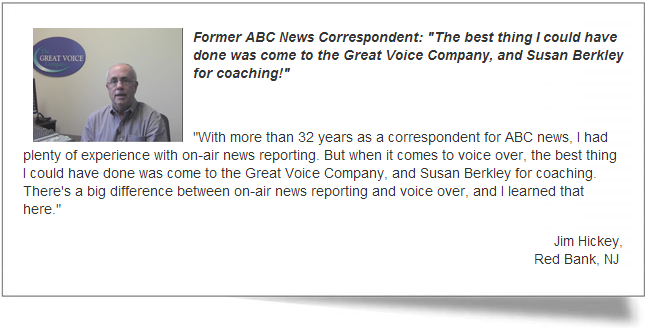
3. Do I need to join a union to do voice overs?
Not necessarily. One can be quite successful as non-union voice over talent but there are some risks which I will explain in a moment.
There are two unions which govern voice over work: AFTRA (American Federation of TV and Radio Artists) and SAG (the Screen Actors Guild). The talent unions offer many benefits which members fought long and hard to gain. For instance, the client must pay you scale and residuals and contribute to a pension and welfare fund on your behalf. Should a client not pay talent for work done under a union contract, the union will sue for collection on your behalf.
Generally, union work is the only work that pays residuals so your earning potential is tremendous. Without a special waiver, union talent is not allowed to do non-union work.
To join the unions there is a substantial initiation fee of over $1000 for each union. This fee will vary depending on the size of your local market. Dues are paid annually depending on talent payments earned during the previous year. AFTRA is an open union, but SAG requires a contract to join.
There is a separate union scale rate for voice overs on TV, radio, cartoons, and non-broadcast usage which differs by market size. Contact the local near you for rates in your area. Because union initiation fees are so high, I advise most people to wait until they book a union job before joining.
When you work as non-union talent, you are on your own. You negotiate your rate with the client and you are responsible for collecting your talent payment. Residuals are generally not paid for non-union work. Unless you negotiate your own contract, the client has the right to use your recording any way he likes without paying you another dime beyond what you received initially.
4. How much money can I make in this business?
A lot. Top voice over talent make six and even seven figure incomes. If you are lucky enough to book a long-running national commercial you can make well over $10,000 in residual payments for just one spot!
But don’t quit your day job. It can take many years of perfecting your talent and marketing yourself before you reach this level of success. Non-union jobs pay anywhere from $75-$400 a commercial depending on market size and whether your commercial runs on TV or radio. While these fees are not astronomical they are certainly good pay for something that’s so much fun to do!
5. Can I do this if I have a “day job”?
Absolutely! In fact, it will probably take a few years before your voice over career is established enough to be your sole means of support. In the meantime, you’ll need to invest some of the money you make at your day job in things like classes, demo tape production and duplication, and marketing expenses to get your voice over career off the ground.
6. But how do I do both? Do they hold auditions and bookings on evenings or weekends?
Unfortunately not. Most voice over sessions happen during normal business hours.
Before you can get work, you need to market yourself. This is done by consistently sending out tapes and following up with phone calls. Tapes can be sent after hours and calls can be made during lunch time or breaks.
Even if you do this consistently, it will probably take several months before you get your first call for an audition or booking. When the call comes take a day off or make some other excuse to duck out of work for a while. Most voice over jobs take about an hour to do.
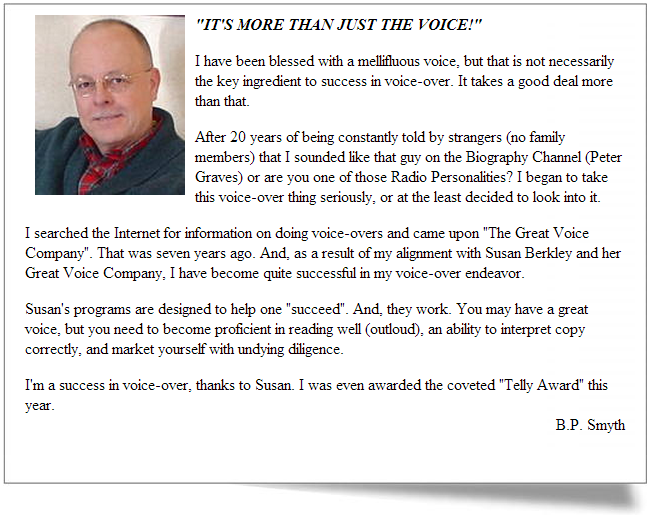
3. Do I need to join a union to do voice overs?
Not necessarily. One can be quite successful as non-union voice over talent but there are some risks which I will explain in a moment.
There are two unions which govern voice over work: AFTRA (American Federation of TV and Radio Artists) and SAG (the Screen Actors Guild). The talent unions offer many benefits which members fought long and hard to gain. For instance, the client must pay you scale and residuals and contribute to a pension and welfare fund on your behalf. Should a client not pay talent for work done under a union contract, the union will sue for collection on your behalf.
Generally, union work is the only work that pays residuals so your earning potential is tremendous. Without a special waiver, union talent is not allowed to do non-union work.
To join the unions there is a substantial initiation fee of over $1000 for each union. This fee will vary depending on the size of your local market. Dues are paid annually depending on talent payments earned during the previous year. AFTRA is an open union, but SAG requires a contract to join.
There is a separate union scale rate for voice overs on TV, radio, cartoons, and non-broadcast usage which differs by market size. Contact the local near you for rates in your area. Because union initiation fees are so high, I advise most people to wait until they book a union job before joining.
When you work as non-union talent, you are on your own. You negotiate your rate with the client and you are responsible for collecting your talent payment. Residuals are generally not paid for non-union work. Unless you negotiate your own contract, the client has the right to use your recording any way he likes without paying you another dime beyond what you received initially.
4. How much money can I make in this business?
A lot. Top voice over talent make six and even seven figure incomes. If you are lucky enough to book a long-running national commercial you can make well over $10,000 in residual payments for just one spot!
But don’t quit your day job. It can take many years of perfecting your talent and marketing yourself before you reach this level of success. Non-union jobs pay anywhere from $75-$400 a commercial depending on market size and whether your commercial runs on TV or radio. While these fees are not astronomical they are certainly good pay for something that’s so much fun to do!
5. Can I do this if I have a “day job”?
Absolutely! In fact, it will probably take a few years before your voice over career is established enough to be your sole means of support. In the meantime, you’ll need to invest some of the money you make at your day job in things like classes, demo tape production and duplication, and marketing expenses to get your voice over career off the ground.
6. But how do I do both? Do they hold auditions and bookings on evenings or weekends?
Unfortunately not. Most voice over sessions happen during normal business hours.
Before you can get work, you need to market yourself. This is done by consistently sending out tapes and following up with phone calls. Tapes can be sent after hours and calls can be made during lunch time or breaks.
Even if you do this consistently, it will probably take several months before you get your first call for an audition or booking. When the call comes take a day off or make some other excuse to duck out of work for a while. Most voice over jobs take about an hour to do.
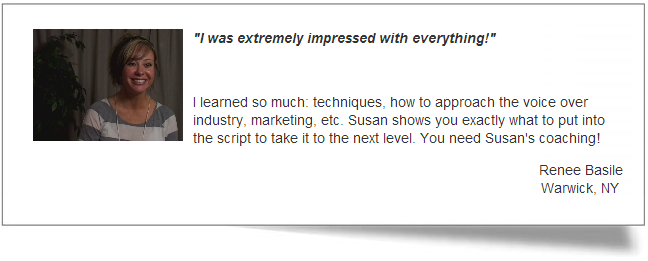
9. How do I get started?
First, find a competent coach to train you in voice over technique and help you with your demo tape. Then, record your tape in a professional studio. Duplicate and distribute the tape to casting directors, agents and production companies. Then, follow up consistently on every tape you send. Keep practicing and working to master your craft.
Warning! Here’s a voice over SCAM to avoid!!
Beware of ads that advertise for “voice talent with no experience needed” in your local paper.
They are typically placed by fly-by-night individuals claiming to be talent agents or managers. Answer the ad and they’ll invite you to their office. Once there, you’ll “audition” by reading a script. They will then gush all over you, compliment you on your voice and promise to make you a star. Then, watch out for the scam. They’ll tell you that if you give them several hundred dollars or more they’ll make your demo tape, duplicate it, send it out and get you work. Sometimes they’ll try to get additional money for headshots or a modeling portfolio.
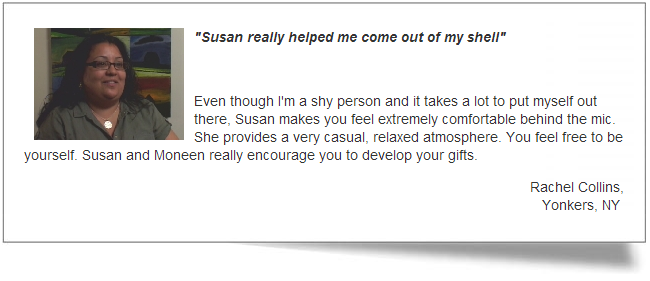
They’ll send you to record a few scripts in some equally shady studio (or maybe record you right on the spot) with no coaching or preparation. And then they’ll take your money, and run! You will never hear from them again and in a few weeks their phones will be disconnected and they will be long gone with your hard earned money!!
A sad story, but one I’ve heard again and again from people who were ripped off.
Here’s how to keep this from happening to you:
1. Never give any money up front to an agent, manager or anyone who promises to get you work. A legitimate agent or manager gets paid their 10 or 15% AFTER they get you the job, never before.
2. Never give money to someone who claims to be an agent or manager for demo tape production.The only person you should pay to help you with your demo is a qualified coach or a legitimate recording studio, which you have thoroughly investigated before you invest.
3. A legitimate agent or manager will never charge the talent for tape duplication or marketing costs. To prevent any “funny business” arrange for tape duplication yourself and pay the duplicator directly. Give the agent or manager a few tapes to send out at his expense and tell him to call you when he needs more. If you don’t hear from him after a month or so, you’re out nothing more than the cost of a few audio cassettes.
4. A legitimate agent or manager will NEVER make promises or ask for money up front for anything. Period.
5. Investigate anyone who claims to be an agent or manager by:
- Calling your local department of consumer affairs
- Talking to experienced actors and voice talent in your area
- Calling your AFTRA or SAG local to see if they are franchised
- Asking for a list of at least 10 other actors who have worked with them so you can check references
- Trusting your gut. If it feels fishy or sounds too good to be true, it probably is!
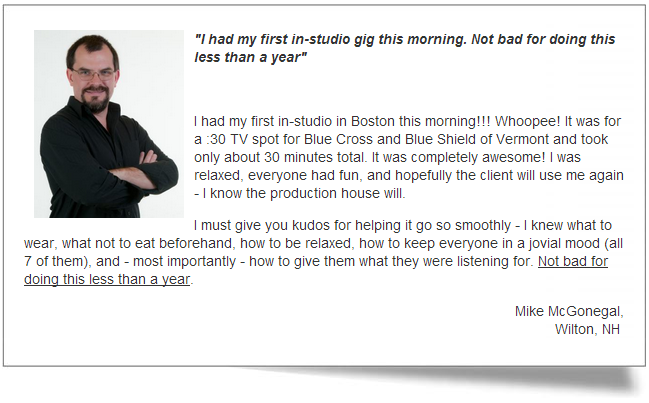
Voice Over Start Here
Become a professional voice over artist working from home in audio books, video games, narrations and more.
Click here for instant access to online training
Flash Sale: Regularly $97 Limited Time $47
Call us at 800-333-8108
talent@greatvoice.com
Get a FREE copy of my book!Voice Over Secrets Exposed: How To Make BIG MONEY With Your Speaking Voice (without leaving your home!)
Inside these pages you’ll discover:
- 14 exciting, fun and unusual ways to use your speaking voice to make big money in voice overs.
- Why the explosion of technology has unleashed a flood of new opportunity in voice over for all types of voices.
- An in-depth look at profitable opportunities in 14 niche voice over markets
- How to set up an inexpensive home studio in a closet or corner of your room
- A proven plan for enjoying a successful home-based voice over business

Do you have what it takes to make it in voice over?
Sign up for a private telephone consultation with one of our Talent Advisors
“Hi, I’m Jim Hickey. With more than 32 years as a correspondent for ABC news, I had plenty of experience with on-air news reporting. But when it comes to voice over, the best thing I could have done was come to the Great Voice Company, and Susan Berkley for coaching. There’s a big difference between on-air news reporting and voice over, and I learned that here.”

Jim Hickey
Former reporter/correspondant
ABC News
The level of coaching you will receive – from interpreting copy to all aspects of the business are like no other. The genuine caring by Susan and Adriana of us being the best we could be was felt by all. We worked hard, and had fun every step of the way.

Michelle Nodiff
Forest Hills, NY
Susan’s programs are designed to help one “succeed”. And, they work. You may have a great voice, but you need to become proficient in reading well (outloud), an ability to interpret copy correctly, and market yourself with undying diligence. I’m a success in voice-over, thanks to Susan. I was even awarded the coveted “Telly Award” this year.

BP Smith

